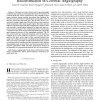Free Online Productivity Tools
i2Speak
i2Symbol
i2OCR
iTex2Img
iWeb2Print
iWeb2Shot
i2Type
iPdf2Split
iPdf2Merge
i2Bopomofo
i2Arabic
i2Style
i2Image
i2PDF
iLatex2Rtf
Sci2ools
120
click to vote
TMI
2010
2010
Spatio-Temporal Data Fusion for 3D+T Image Reconstruction in Cerebral Angiography
—This paper provides a framework for generating high resolution time sequences of 3D images that show the dynamics of cerebral blood flow. These sequences have the potential to allow image feedback during medical procedures that facilitate the detection and observation of pathological abnormalities such as stenoses, aneurysms, and blood clots. The 3D time series is constructed by fusing a single static 3D model with two time sequences of 2D projections of the same imaged region. The fusion process utilizes a variational approach that constrains the volumes to have both smoothly varying regions separated by edges and sparse regions of nonzero support. The variational problem is solved using a modified version of the Gauss–Seidel algorithm that exploits the spatio-temporal structure of the angiography problem. The 3D time series results are visualized using time series of isosurfaces, synthetic X-rays from arbitrary perspectives or poses, and 3D surfaces that show arrival times of ...
Blood Clots | Time Sequences | Time Series | TMI 2010 |
| Added | 31 Jan 2011 |
| Updated | 31 Jan 2011 |
| Type | Journal |
| Year | 2010 |
| Where | TMI |
| Authors | Andrew Copeland, Rami Mangoubi, Mukund N. Desai, Sanjoy K. Mitter, Adel M. Malek |
Comments (0)

